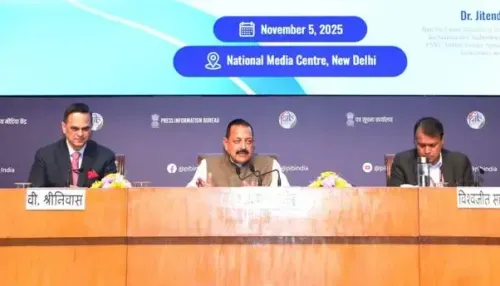Why Do Only 3 Out of 5 Heart Failure Patients Visit a Cardiologist Annually?

Synopsis
Key Takeaways
- Only 60% of heart failure patients see a cardiologist annually.
- Annual consultations can reduce mortality risk by 24%.
- One life could be saved for every 11-16 patients seen.
- Four cardiology appointments annually are optimal for recently hospitalized patients.
- Diuretics help manage fluid retention in heart failure patients.
New Delhi, May 18 (NationPress) According to a recent study released on Sunday, only about three out of five heart failure patients consult a cardiologist at least once each year.
The research, published in the European Heart Journal, indicates that patients who do see a cardiologist annually have a 24% lower risk of mortality in the subsequent year.
Additionally, it identifies which patients would benefit from an annual cardiology visit and those who may require more frequent consultations. The findings suggest that if cardiologists could meet with heart failure patients at least once per year, it could result in one life saved for every 11 to 16 patients seen.
“In individuals with heart failure, the heart struggles to maintain proper blood flow and pressure. While heart failure typically cannot be cured, appropriate treatments can often manage symptoms effectively for extended periods. Currently, whether patients receive a cardiologist's care depends on their specific circumstances, such as the type of heart failure they have,” explained Dr. Guillaume Baudry from the Clinical Investigation Centre of Nancy University Hospital in France.
The study involved 655,919 French patients diagnosed with heart failure within the last five years as of January 2020.
Researchers utilized national medical administrative data to categorize patients based on their hospitalization history for heart failure over the last year or five years, and whether they were on diuretic medications.
Diuretics assist in eliminating excess sodium through urine, mitigating fluid retention in the body.
Across all patient groups, findings revealed that approximately two out of five patients did not consult a cardiologist within the year.
Those who did see a cardiologist exhibited a lower likelihood of mortality and reduced hospitalization rates due to heart failure in the subsequent year.
For patients hospitalized in the last year, having four appointments with a cardiologist was deemed optimal, decreasing the risk from 34.3% to 18.2%, as per the study.
Dr. Baudry remarked, “Despite the limitations of observational studies, our results underscore the potential benefits of specialist follow-up, even for patients who seem clinically stable. It is essential for patients to seek a cardiology review, especially if they have recently been hospitalized or are on diuretics.”









